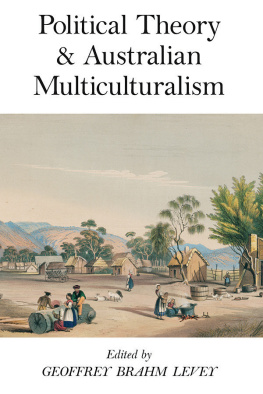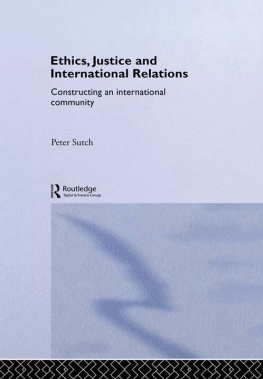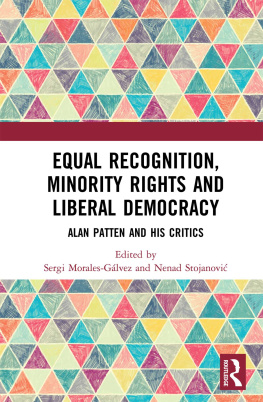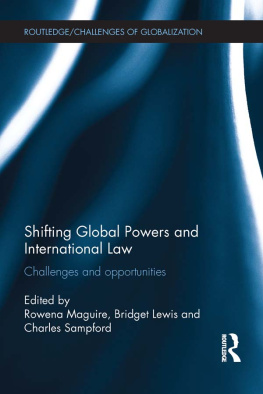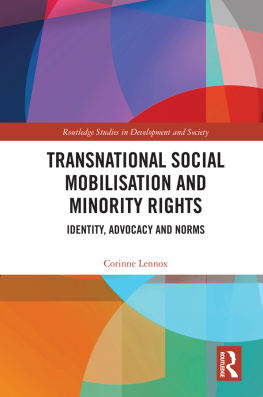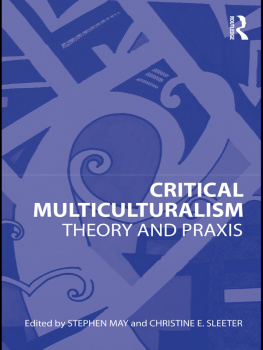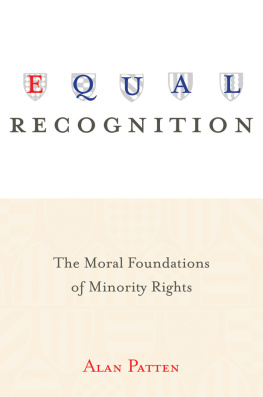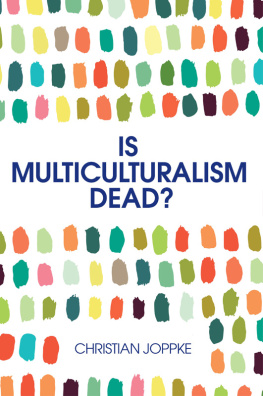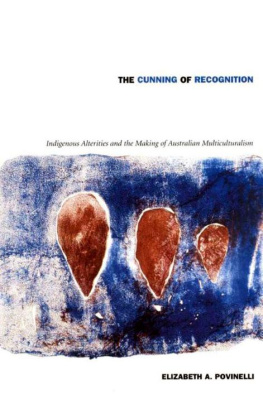Multicultural Odysseys
Multicultural Odysseys
Navigating the New International Politics of Diversity
Will Kymlicka


Great Clarendon Street, Oxford OX2 6DP
Oxford University Press is a department of the University of Oxford.
It furthers the Universitys objective of excellence in research, scholarship,
and education by publishing worldwide in
Oxford New York
Auckland Cape Town Dar es Salaam Hong Kong Karachi
Kuala Lumpur Madrid Melbourne Mexico City Nairobi
New Delhi Shanghai Taipei Toronto
With offices in
Argentina Austria Brazil Chile Czech Republic France Greece
Guatemala Hungary Italy Japan Poland Portugal Singapore
South Korea Switzerland Thailand Turkey Ukraine Vietnam
Oxford is a registered trademark of Oxford University Press
in the UK and in certain other countries
Published in the United States
by Oxford University Press Inc., New York
Will Kymlicka 2007
The moral rights of the author have been asserted
Database right Oxford University Press (maker)
First published 2007
First published in paperback 2009
All rights reserved. No part of this publication may be reproduced,
stored in a retrieval system, or transmitted, in any form or by any means,
without the prior permission in writing of Oxford University Press,
or as expressly permitted by law, or under terms agreed with the appropriate
reprographics rights organization. Enquiries concerning reproduction
outside the scope of the above should be sent to the Rights Department,
Oxford University Press, at the address above
You must not circulate this book in any other binding or cover
and you must impose the same condition on any acquirer
British Library Cataloguing in Publication Data
Data available
Library of Congress Cataloging in Publication Data
Data available
Typeset by SPI Publisher Services, Pondicherry, India
Printed in Great Britain
on acid-free paper by
Clays Ltd., Bungay, Suffolk
ISBN 978-0-19-928040-7 (Hbk.)
ISBN 978-0-19-956255-8 (Pbk.)
10 9 8 7 6 5 4 3 2 1
Acknowledgements
This book covers a lot of territory, intellectually and geographically, much of it some distance from my initial training as a political philosopher. I would not have been able to write it without the advice and encouragement of many friends and colleagues who have helped me navigate through unfamiliar waters.
Ive had the good fortune of working with some wonderful colleagues on projects closely related to this book, including three edited volumes: Can Liberal Pluralism Be Exported? Western Political Theory and Ethnic Relations in Eastern Europe, co-edited with Magda Opalski; Multiculturalism in Asia, co-edited with Baogang He; and Ethnicity and Democracy in Africa, co-edited with Bruce Berman and Dickson Eyoh. Special thanks to my co-editors, and the contributors, for introducing me to the global dimensions of these issues.
The ideas in this book were first tried out in a number of conferences, seminars, and workshops over the past few years, and Im grateful to the organizers who invited me, and to the colleagues and audiences who provided very helpful feedback. There are too many to list individually, but I owe a special thanks to the following people and institutions for arranging particularly informative and challenging trips that might not otherwise have been possible: Rupak Chattopadhyay at the Forum of Federations and Rohan Edrisinha at the Centre for Policy Alternatives for an invitation to Sri Lanka; Carlos Mendoza at the United Nations Development Program for a visit to Guatemala; Brian Selmeski at the Canadian Defense Academy and Ricardo Calla Ortega at the Bolivian Ministry of Indigenous Affairs for a visit to Bolivia; Christopher Hull at the Canadian Embassy in Damascus and Sari Hanafi at the American University in Beirut, who helped arrange an unforgettable lecture series in Syria and Lebanon; David Turton and the British Council for an invitation to Ethiopia; Ishiyama Fumihiko, Morigiwa Yasutomo and Sakurai Tetsu at IVR Japan, who arranged a lecture series in Japan; Daniel A. Bell, who arranged talks at the City University of Hong Kong and Fudan University in Shanghai; Chusnul Mariyah and Rosa Evaquarta at the University of Indonesia; and Serguei Koutznetsov at the European Commission on Democracy through Law for a conference in Moldova.
Ive had the privilege of participating in several comparative projects on stateminority relations, including the Carnegie Foundations Comparative Citizenship Project directed by Alexander Aleinikoff and Douglas Klusmeyer; the Friedrich Naumann Foundations project on international minority rights, directed by Gerhart Raichle, and the United Nations Human Development Report on Cultural Liberty, directed by Sakiko Parr-Fukada. Id like to thank them, and their colleagues, for inviting me to participate.
Over the years, I have benefited from extended discussions and assistance from several colleagues, particularly Marc Weller, Franois Grin, Graham Holliday and Tove Malloy at the European Centre for Minority Issues; Sally Holt and John Packer at the Office of the High Commissioner on National Minorities of the Organization for Security and Cooperation in Europe; Levente Salat at the Ethnocultural Diversity Resource Centre in Cluj, Romania; Donna Lee Van Cott, Maria Kovacs, Joseph Carens, Avigail Eisenberg, Bashir Bashir, and Jacob Levy. Special thanks to my colleagues in the Canadian Institute for Advanced Researchs Successful Societies program. Our discussions have been invaluable in helping me situate these issues in a broader historical and social perspective.
Closer to home, Id like to thank several people here at Queens with whom I have been working closely, including Keith Banting in the School of Policy Studies, my co-author in several projects relating to diversity, citizenship and the welfare state; Margaret Moore, John McGarry, and Bruce Berman in the Political Studies department, my colleagues in the new Ethnicity and Democratic Governance project; and my supportive colleagues in the Philosophy Department.
My work on this topic has been made possible by a Killam Fellowship from the Canada Council for the Arts, fellowships from the Trudeau Foundation and the Canadian Institute for Advanced Research, as well as by research grants from the Social Sciences and Humanities Research Council of Canada, and the Canada Research Chairs program. Im very grateful for their support.
Ive had excellent research assistance from Lisa Vanhala, Siobhan Byrne, Michael Kocsis, and Omid Hejazi. For helpful comments on earlier drafts of this manuscript, many thanks to Corinne Lennox, Stefan Ehrentraut, Alexander Osipov, Peter Hall, Wayne Norman, Rainer Baubock, and especially Sue Donaldson, whose comments and suggestions have profoundly shaped this project from the initial proposal to the final edits.
Thanks, as always, to my wonderful editor at OUP, Dominic Byatt, who has patiently waited for this book, Kate Hind for shepherding it through the production process, and to Virginia Williams for her careful copy-editing.
Im very grateful to Gary Fiegehen and the Nisgaa Lisims government for permission to use the beautiful cover image. The carving was one of several artifacts repatriated to the Nisgaa under the terms of their 1998 Treaty with the Canadian government, which is an important example and hopeful symbol of the new politics of diversity discussed in this book.
Next page

